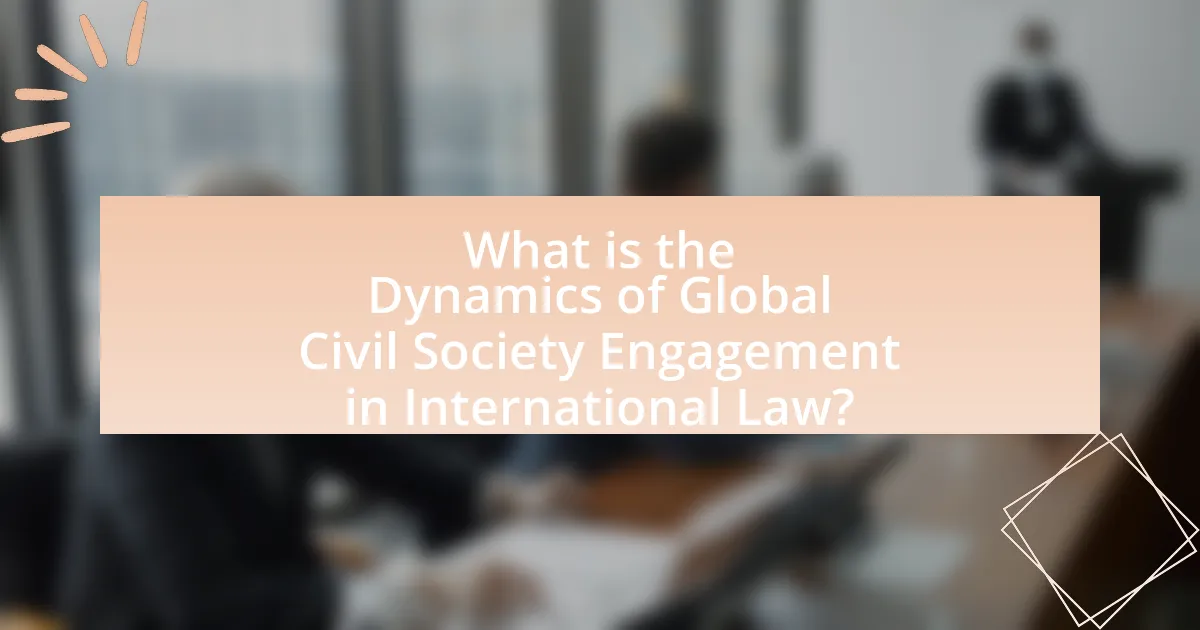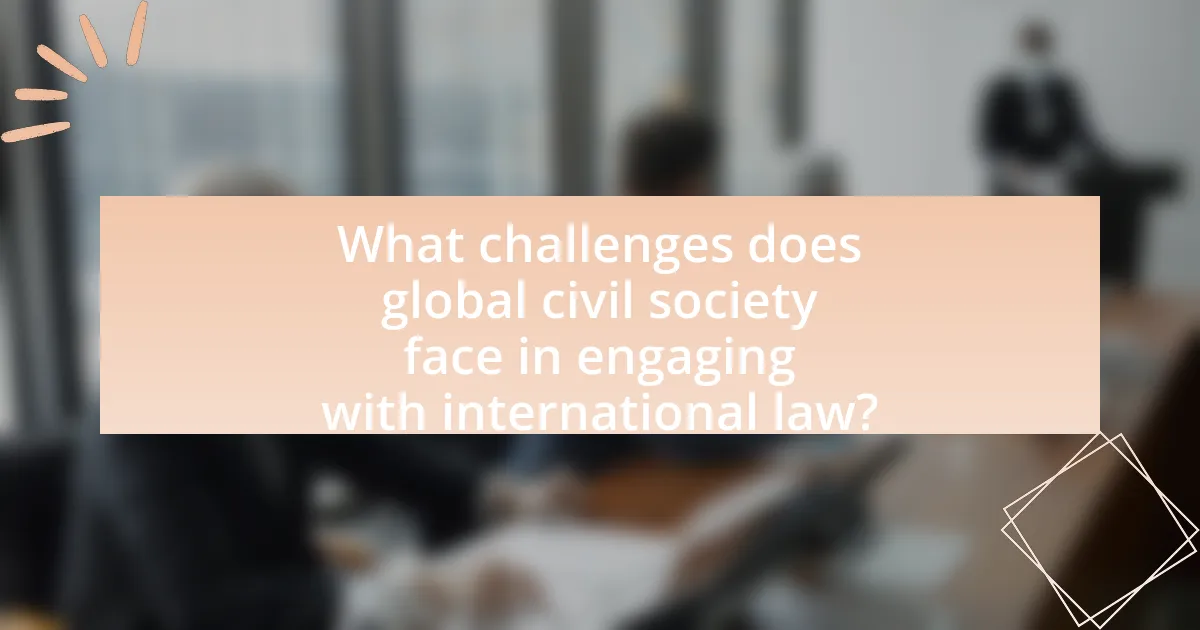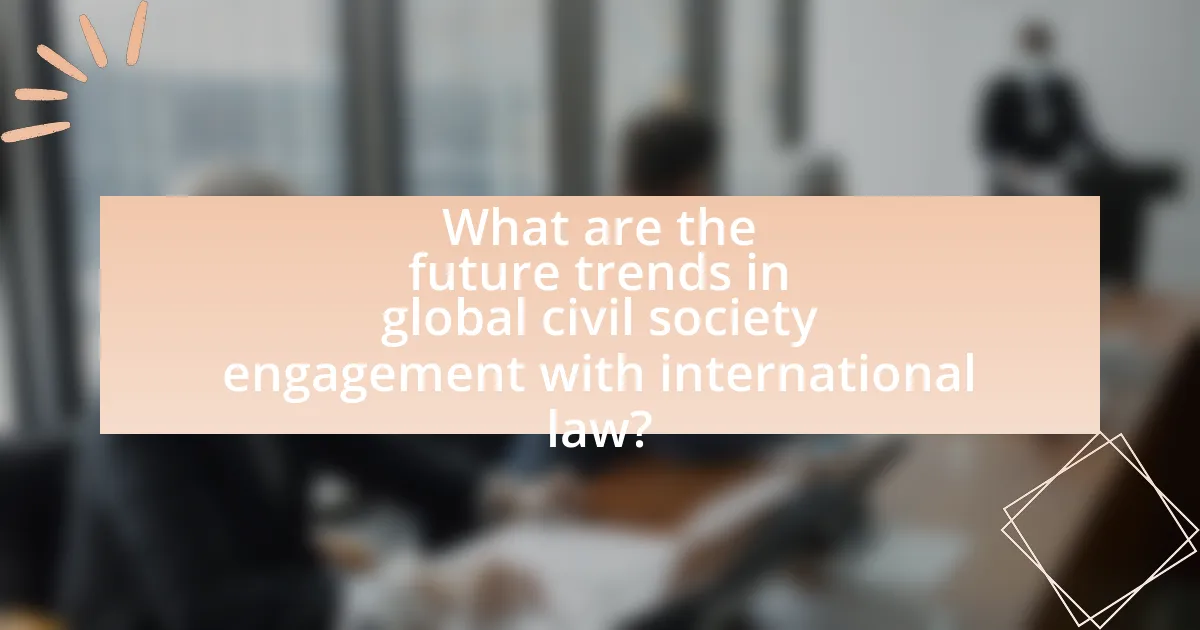The article examines the dynamics of global civil society engagement in international law, highlighting the role of non-state actors such as NGOs and grassroots organizations in shaping legal frameworks and influencing policy decisions. It discusses how these entities engage through advocacy, monitoring, and participation in legal processes, emphasizing their impact on human rights, environmental protection, and social justice. Key actors, challenges, and strategies for effective engagement are analyzed, along with the implications of civil society’s involvement for accountability and transparency in international law. The article also explores future trends, including digital activism and collaborative approaches, that are shaping civil society’s role in the international legal landscape.

What is the Dynamics of Global Civil Society Engagement in International Law?
The dynamics of global civil society engagement in international law involve the active participation of non-state actors, such as NGOs and grassroots organizations, in shaping legal frameworks and influencing policy decisions at the international level. This engagement is characterized by advocacy, lobbying, and the mobilization of public opinion to promote human rights, environmental protection, and social justice. For instance, organizations like Amnesty International and Human Rights Watch have successfully lobbied for the establishment of international treaties and conventions, demonstrating the significant impact civil society can have on international legal processes.
How does global civil society engage with international law?
Global civil society engages with international law primarily through advocacy, monitoring, and participation in legal processes. Organizations such as Amnesty International and Human Rights Watch actively lobby for the adoption and enforcement of international treaties, influencing state behavior and policy. They also monitor compliance with international law, providing reports and data that highlight violations, which can lead to accountability measures. Furthermore, civil society groups participate in international legal forums, such as the United Nations, where they contribute to discussions and negotiations, ensuring that diverse perspectives are represented in the formulation of international legal standards. This engagement is crucial for promoting human rights and environmental protections on a global scale.
What are the key actors in global civil society?
The key actors in global civil society include non-governmental organizations (NGOs), grassroots movements, social movements, advocacy groups, and transnational networks. These entities play crucial roles in shaping public policy, promoting human rights, and influencing international law. For instance, organizations like Amnesty International and Human Rights Watch actively campaign for human rights protections globally, demonstrating the impact of NGOs on international legal frameworks. Additionally, grassroots movements, such as climate action groups, mobilize public support and pressure governments to adopt sustainable policies, further illustrating the diverse contributions of civil society actors in the global arena.
How do these actors influence international legal frameworks?
Actors such as non-governmental organizations (NGOs), multinational corporations, and intergovernmental organizations influence international legal frameworks by advocating for specific legal norms and standards. These actors engage in lobbying efforts, participate in international negotiations, and mobilize public opinion to shape the agenda of international law. For instance, NGOs like Amnesty International have successfully pushed for the inclusion of human rights provisions in treaties, demonstrating their impact on legal frameworks. Additionally, multinational corporations often influence trade agreements by negotiating terms that align with their interests, thereby affecting international economic law. This dynamic interaction illustrates how diverse actors contribute to the evolution and implementation of international legal standards.
Why is civil society engagement important in international law?
Civil society engagement is important in international law because it enhances accountability, promotes transparency, and ensures that diverse perspectives are considered in the law-making process. Civil society organizations often act as watchdogs, monitoring state compliance with international obligations and advocating for the rights of marginalized groups. For instance, the involvement of NGOs in the drafting of the Convention on the Rights of Persons with Disabilities led to a more inclusive framework that reflects the needs of individuals with disabilities. This engagement not only enriches the legal discourse but also fosters public awareness and participation, ultimately strengthening the legitimacy and effectiveness of international legal instruments.
What role does civil society play in promoting human rights?
Civil society plays a crucial role in promoting human rights by advocating for accountability, raising awareness, and mobilizing public support. Organizations within civil society, such as non-governmental organizations (NGOs) and grassroots movements, actively engage in monitoring human rights violations, providing legal assistance, and influencing policy changes. For instance, the Human Rights Watch and Amnesty International have documented abuses and lobbied for legislative reforms, demonstrating the effectiveness of civil society in holding governments accountable. Additionally, civil society fosters dialogue and education on human rights issues, empowering individuals and communities to assert their rights and demand justice.
How does civil society contribute to accountability in international law?
Civil society contributes to accountability in international law by acting as a watchdog that monitors state behavior and promotes transparency. Organizations within civil society, such as non-governmental organizations (NGOs) and advocacy groups, gather data, document human rights abuses, and raise awareness about violations of international law. For instance, Human Rights Watch and Amnesty International have reported extensively on state actions, influencing public opinion and policy changes. Additionally, civil society engages in legal advocacy, submitting amicus curiae briefs in international courts, which can shape judicial outcomes and reinforce accountability mechanisms. This engagement is crucial, as it holds states accountable to their international obligations and fosters a culture of compliance with international norms.

What challenges does global civil society face in engaging with international law?
Global civil society faces significant challenges in engaging with international law, primarily due to limited access to legal frameworks and decision-making processes. This limited access often stems from the dominance of state actors in international law, which marginalizes non-state actors, including NGOs and grassroots organizations. Furthermore, the complexity of international legal systems can hinder effective participation, as many civil society organizations lack the resources and expertise to navigate these intricate frameworks. Additionally, political resistance from states that may view civil society engagement as a threat to sovereignty can further obstruct meaningful involvement. For instance, in the context of human rights law, states may restrict the ability of civil society to influence treaty negotiations or implementation, thereby undermining the potential for advocacy and accountability.
What are the barriers to effective engagement?
Barriers to effective engagement in the context of global civil society and international law include lack of resources, insufficient access to information, and limited representation in decision-making processes. These barriers hinder organizations from participating fully in dialogues and negotiations that shape international law. For instance, a study by the United Nations Development Programme highlights that many civil society organizations lack the financial and human resources necessary to engage effectively, which limits their ability to influence policy outcomes. Additionally, the complexity of international legal frameworks often results in inadequate access to relevant information, further obstructing meaningful participation. Lastly, the underrepresentation of marginalized groups in international forums perpetuates inequities, as their perspectives are often overlooked in the decision-making processes.
How do political and legal obstacles impact civil society’s role?
Political and legal obstacles significantly restrict civil society’s role by limiting their ability to operate freely and engage in advocacy. These obstacles can manifest as restrictive laws, government censorship, or repression of dissent, which hinder civil society organizations from mobilizing resources, accessing information, and participating in policy-making processes. For instance, in countries with stringent regulations on NGOs, such as Russia, civil society faces challenges in funding and operational autonomy, leading to diminished influence on public discourse and policy. This suppression not only stifles diverse voices but also undermines democratic processes, as civil society is crucial for holding governments accountable and representing marginalized communities.
What funding challenges do civil society organizations encounter?
Civil society organizations encounter significant funding challenges, primarily due to reliance on limited sources of financial support. Many organizations depend on government grants, which can be unstable and subject to political changes, leading to uncertainty in funding continuity. Additionally, competition for philanthropic donations is intense, with numerous organizations vying for the same pool of resources, often resulting in insufficient funding for their initiatives. According to a report by the International Center for Not-for-Profit Law, over 70% of civil society organizations globally report funding constraints as a major barrier to their operations. This financial instability hampers their ability to effectively engage in international law advocacy and limit their overall impact.
How do these challenges affect the outcomes of civil society engagement?
Challenges such as restrictive legal frameworks, limited funding, and political repression significantly hinder the outcomes of civil society engagement. These obstacles can lead to decreased participation, reduced effectiveness in advocacy efforts, and diminished public trust in civil society organizations. For instance, according to the 2021 CIVICUS Monitor, over 40% of the world’s population lives in countries where civic space is closed or repressed, which directly correlates with weakened civil society influence on policy-making and social change. Additionally, limited financial resources restrict organizations’ ability to mobilize and sustain their activities, further undermining their impact on international law and governance.
What are the implications for international legal processes?
The implications for international legal processes include increased accountability and transparency due to the active participation of global civil society. This engagement allows non-state actors to influence legal norms and practices, leading to a more inclusive approach to international law. For instance, the involvement of NGOs in treaty negotiations has historically resulted in stronger human rights protections, as seen in the Convention on the Rights of the Child, which was significantly shaped by civil society advocacy. Consequently, the dynamics of global civil society engagement enhance the legitimacy and responsiveness of international legal frameworks.
How can civil society overcome these challenges?
Civil society can overcome challenges in engaging with international law by fostering collaboration among diverse stakeholders, including NGOs, grassroots organizations, and academic institutions. This collaborative approach enhances resource sharing, amplifies voices, and strengthens advocacy efforts. For instance, the Global Partnership for the Prevention of Armed Conflict demonstrates how collective action can influence policy changes at international levels. Additionally, leveraging technology for communication and mobilization allows civil society to reach broader audiences and engage in real-time advocacy, as seen in movements like the Arab Spring, where social media played a crucial role in organizing and raising awareness.

What are the future trends in global civil society engagement with international law?
Future trends in global civil society engagement with international law include increased digital activism, enhanced collaboration with international organizations, and a focus on intersectionality in advocacy. Digital platforms enable civil society groups to mobilize support and disseminate information rapidly, as seen in movements like #MeToo and climate justice campaigns. Collaboration with entities such as the United Nations and regional bodies is becoming more common, allowing civil society to influence policy-making processes directly. Additionally, there is a growing emphasis on intersectionality, recognizing how various social identities impact individuals’ experiences with international law, which is reflected in the work of organizations advocating for marginalized communities. These trends indicate a shift towards more inclusive and technologically savvy approaches in civil society’s engagement with international law.
How is technology shaping civil society’s engagement?
Technology is significantly shaping civil society’s engagement by enhancing communication, mobilization, and advocacy efforts. Digital platforms enable organizations to reach wider audiences, facilitating real-time information sharing and collaboration across borders. For instance, social media has been instrumental in organizing movements like the Arab Spring, where activists utilized platforms to coordinate protests and disseminate information rapidly. Furthermore, technology allows for greater transparency and accountability, as tools like blockchain can track donations and ensure funds are used appropriately. This increased visibility fosters trust and encourages more individuals to participate in civil society initiatives.
What digital tools are being utilized for advocacy?
Digital tools utilized for advocacy include social media platforms, email campaigns, online petitions, and data visualization tools. Social media platforms like Twitter and Facebook enable organizations to reach large audiences quickly, facilitating real-time engagement and mobilization. Email campaigns allow for targeted communication, while online petitions, such as those hosted on Change.org, gather support for specific causes. Data visualization tools, like Tableau, help present complex information in an accessible manner, enhancing the effectiveness of advocacy efforts. These tools collectively enhance the ability of civil society organizations to influence policy and engage with stakeholders in the realm of international law.
How does social media influence public awareness and mobilization?
Social media significantly influences public awareness and mobilization by providing a platform for rapid information dissemination and community engagement. It enables individuals and organizations to share news, mobilize support, and organize events quickly, often reaching a global audience. For instance, during the Arab Spring, social media platforms like Twitter and Facebook were instrumental in organizing protests and spreading awareness about political issues, leading to significant social change in multiple countries. Research by the Pew Research Center indicates that 69% of adults in the U.S. use social media, highlighting its role as a primary source of news and information. This widespread usage facilitates collective action and enhances public engagement in social and political movements.
What strategies can enhance civil society’s impact on international law?
Strategies that can enhance civil society’s impact on international law include advocacy for policy change, building coalitions, and leveraging technology for awareness and mobilization. Advocacy for policy change allows civil society organizations to influence lawmakers and international bodies by presenting evidence-based arguments and engaging in dialogue, as seen in campaigns like the International Campaign to Ban Landmines, which successfully led to the Ottawa Treaty. Building coalitions among diverse stakeholders amplifies voices and resources, enabling more effective lobbying efforts, exemplified by the Global Fund for Women, which unites various organizations to promote women’s rights globally. Leveraging technology, such as social media platforms, facilitates rapid dissemination of information and mobilization of support, demonstrated by movements like #MeToo, which raised awareness of sexual harassment and influenced legal reforms in multiple countries. These strategies collectively strengthen civil society’s role in shaping and enforcing international law.
What collaborative approaches are emerging among civil society organizations?
Collaborative approaches emerging among civil society organizations include multi-stakeholder partnerships, coalitions for advocacy, and shared resource networks. Multi-stakeholder partnerships involve collaboration between civil society, governments, and private sectors to address complex global issues, such as climate change and human rights. For instance, the Global Partnership for Effective Development Cooperation exemplifies this approach by bringing together diverse actors to enhance development effectiveness. Coalitions for advocacy, such as the International Campaign to Ban Landmines, unite various organizations to amplify their voices and influence policy changes at international levels. Shared resource networks, like the Open Government Partnership, facilitate the exchange of knowledge and best practices among organizations to promote transparency and accountability. These approaches reflect a trend towards collective action and resource sharing to enhance the impact of civil society in international law and governance.
How can partnerships with governmental and intergovernmental bodies be strengthened?
Partnerships with governmental and intergovernmental bodies can be strengthened through enhanced communication and collaboration mechanisms. Establishing regular dialogue platforms, such as joint task forces or advisory committees, facilitates the exchange of ideas and best practices. For instance, the United Nations has successfully utilized multi-stakeholder partnerships to address global challenges, demonstrating that structured engagement can lead to more effective policy outcomes. Additionally, aligning objectives and creating shared goals can foster trust and commitment, as seen in initiatives like the Sustainable Development Goals, where diverse actors work together towards common targets.
What best practices can civil society organizations adopt for effective engagement in international law?
Civil society organizations can adopt several best practices for effective engagement in international law, including building coalitions, utilizing evidence-based advocacy, and enhancing communication strategies. Building coalitions allows organizations to pool resources and amplify their voices, as seen in the successful collaboration of various NGOs during the 2015 Paris Climate Agreement negotiations. Utilizing evidence-based advocacy ensures that arguments are grounded in reliable data, which can influence policymakers; for instance, studies by the World Health Organization have shown that data-driven approaches can lead to more effective health policies. Enhancing communication strategies, such as leveraging social media platforms, enables organizations to reach broader audiences and mobilize support, as demonstrated by campaigns like #MeToo, which effectively raised awareness about sexual harassment and influenced legal reforms globally.